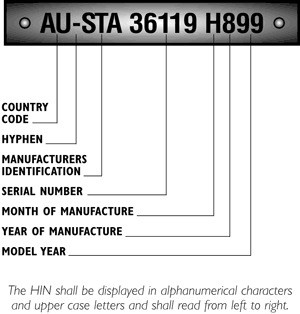Unlocking Your Boat's Secrets: Finding the Hull Identification Number (HIN)

Ever feel like your boat holds a hidden code, a secret language whispered only to those in the know? Well, it does! Every vessel carries a unique identifier, its very own fingerprint: the Hull Identification Number (HIN). Knowing where to find this crucial sequence of characters is like unlocking a treasure trove of information about your watercraft's past, present, and future.
Imagine buying a used boat, a gleaming beauty ready for adventure. But how can you be sure of its history, its legality, and its true value? The HIN is your key. This number, much like a car's VIN, provides a wealth of details about the boat's manufacturer, model year, and even its unique serial number. Ignoring this critical piece of information is like sailing into uncharted waters blindfolded.
Locating the HIN isn't rocket science, but it does require a bit of detective work. Typically, it's permanently affixed to the transom, the back of the boat. Think of it as the boat's birthmark, etched into its very being. However, the exact location can vary depending on the boat's type and manufacturer. We'll delve deeper into specific locations later, but the key is to be persistent and thorough in your search.
The HIN is more than just a random string of characters; it's your boat's official identity. This alphanumeric code is essential for registration, insurance, and even selling your boat. Think of it as your boat's passport, allowing it to navigate the legal and logistical waters of ownership. Without a readily accessible and verifiable HIN, you could encounter significant hurdles in managing your watercraft.
So, why is understanding the HIN so vital? Simply put, it protects you. It helps ensure you're not unknowingly purchasing a stolen boat, verifying the vessel's specifications, and facilitating smooth transactions. It's a fundamental aspect of responsible boat ownership, offering a layer of security and peace of mind that every boat owner deserves. This article serves as your guide, navigating you through the intricacies of the HIN, from its location to its importance, ensuring you're equipped to unlock your boat's secrets and embark on your aquatic adventures with confidence.
The HIN system was introduced in 1972 in the US to standardize boat identification. Before that, various manufacturers used different numbering systems, making it difficult to track boats and enforce regulations. The HIN is vital for law enforcement, insurance companies, and boat owners to identify and track vessels, deter theft, and ensure accurate documentation. Its importance lies in its universality and standardization across the boating industry.
The HIN typically consists of 12 characters. It starts with three letters representing the manufacturer, followed by a serial number and then the model year. For example, if the HIN is ABC12345D789, ABC is the manufacturer code, 12345 is the serial number, and D789 indicates the model year.
Benefits of knowing the HIN location:
1. Verify boat ownership: The HIN is crucial during the purchase process to confirm the seller's legitimate ownership.
2. Obtain insurance: Insurance companies require the HIN to issue policies and assess risks.
3. Report theft or accidents: In case of theft or accidents, the HIN is vital for reporting and recovery.
Action Plan to locate the HIN:
1. Check the transom: Look for the HIN on the starboard side (right side) of the transom above the waterline.
2. Inspect the hull: If not on the transom, check the outermost starboard side of the hull.
3. Consult the owner's manual: The manual should specify the HIN location for your specific boat model.
Advantages and Disadvantages of having a HIN
| Advantages | Disadvantages |
|---|---|
| Proof of Ownership | Can be tampered with (although illegal) |
| Essential for Insurance | Doesn't prevent all theft |
| Aids in Recovery | Can be difficult to locate on older boats |
Best Practices:
1. Always verify the HIN when buying a used boat.
2. Keep a record of your boat's HIN in a safe place.
3. Report any discrepancies in the HIN to the authorities.
4. Ensure the HIN is clearly visible and not obscured by paint or other materials.
5. Educate yourself on the HIN format and how to decode it.
FAQ:
1. What does HIN stand for? Hull Identification Number.
2. Is the HIN required by law? Yes, for most boats.
3. What if I can't find the HIN? Consult the manufacturer or a boat registration agency.
4. Can the HIN be duplicated? No, each HIN is unique.
5. How long is a HIN? 12 characters.
6. What if my HIN is damaged? Contact the manufacturer or registration agency for guidance.
7. Can I register a boat without a HIN? Generally, no.
8. Where can I learn more about HIN regulations? Contact your local boating authority.
Tips and Tricks: Use a flashlight and mirror to inspect hard-to-reach areas. Clean the area around the HIN for better visibility. Take a photo of the HIN for your records.
The Hull Identification Number (HIN) is more than just a string of characters; it’s your boat’s identity, its passport to the waterways. Knowing where to find it, understanding its meaning, and appreciating its importance are fundamental aspects of responsible boat ownership. From verifying ownership during purchase to ensuring proper registration and insurance, the HIN plays a crucial role in protecting your investment and ensuring smooth sailing. By taking the time to locate and understand your boat’s HIN, you're not just deciphering a code; you’re gaining control, securing your investment, and ensuring years of enjoyable boating experiences. Don’t let this crucial piece of information remain a mystery. Take action today, locate your HIN, and unlock the secrets your boat holds. Your peace of mind and the future of your boating adventures depend on it.
Lil tjays incarceration exploring the impact
Uks used rav4 market score a sweet deal on your dream ride
Tay savage net worth unraveling the financial success story













